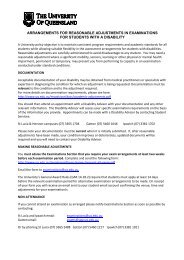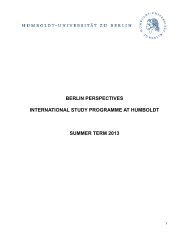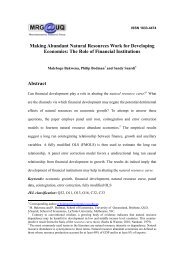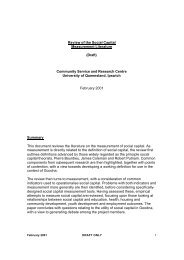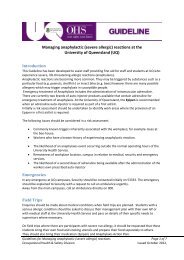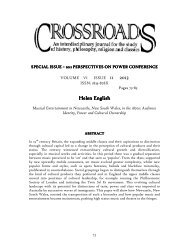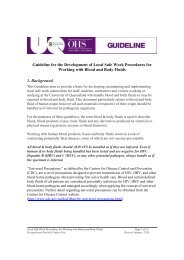Thinking, Willing and Judging - University of Queensland
Thinking, Willing and Judging - University of Queensland
Thinking, Willing and Judging - University of Queensland
Create successful ePaper yourself
Turn your PDF publications into a flip-book with our unique Google optimized e-Paper software.
this example also reveals a tension within Deutscher’s account. It is a tension that is present in the aboveexample <strong>of</strong> the getaway driver who is both willing <strong>and</strong> reluctant (unwilling?). Such a person seems to be, in onesense, comm<strong>and</strong>ing himself to act in a certain way, <strong>and</strong> in another sense, to be a slave who reluctantly carriesout the comm<strong>and</strong>s he is given. Is this a case <strong>of</strong> being willing to act in a certain way? Does being willing amountto going-to-do-something (as when we have a firm will to do what is right, even if we have to force ourselves todo this somewhat reluctantly) or going-to-do-something-willingly (so that we also want or desire to act as wehave set ourselves to act <strong>and</strong> thus undertake the act willingly, freely, without having to force ourselves)?Precisely these sorts <strong>of</strong> examples are central to Kant’s account <strong>of</strong> willing. Although Kant looms large inArendt’s accounts <strong>of</strong> thinking <strong>and</strong> judging, she simply ignores, or rather does not even seem to be aware <strong>of</strong>,Kant’s account <strong>of</strong> willing. li As such she misses Kant’s distinction between will (Wille) <strong>and</strong> power <strong>of</strong> choice(Willkür). lii While Wille is a matter <strong>of</strong> reason, Willkür is a matter <strong>of</strong> choice. Willkür is always free as it is neversimply determined by inclinations or reason but rather adopts intentions or maxims (what it is going-to-do)through the incorporation <strong>of</strong> either sensible or rational grounds. <strong>Willing</strong> is going-to-do something for a reason,<strong>and</strong> that reason can either be conditional on the presence <strong>of</strong> some contingent desire or interest, or it can becategorical <strong>and</strong> therefore based on the ends-in-themselves status <strong>of</strong> persons.In order to prove that pure reason can be practical, Kant considers examples where we set ourselves to dosomething unwillingly. liii He gives the example <strong>of</strong> a man who is ordered by a tyrant to commit perjury, therebycondemning another innocent man to death, but gaining financial reward in the process. liv If he refuses, he willbe badly tortured <strong>and</strong> executed. We can read Kant here as arguing that the consequences <strong>of</strong> refusing to perjureourselves are so horrible that no one would willingly undergo them. But even so, we can choose to do what isright by refusing to perjure ourselves. We can will to do so, to be in a state <strong>of</strong> going-to-do what is right, even ifthis must be done unwillingly.If this example carries any weight then it shows us that being in a state <strong>of</strong> going-to-do something, <strong>and</strong> beingwilling to do it (in the sense <strong>of</strong> willingness, the absence <strong>of</strong> reluctance or division), can come apart. Of course,Kant does not think that it is a good thing when they do come apart. But, given that our world is one wherehappiness is not distributed according to virtue, it will sometimes happen that what is right is something we areunwilling to do, as when morality (as in the case <strong>of</strong> the tyrant) requires a very great sacrifice <strong>of</strong> interest oropposes what we are very strongly inclined to do. We do not sacrifice these things willingly, but even so, we canwill to do so.However, Deutscher also writes that ‘the ‘comm<strong>and</strong>ing’ will as bringing order to quarrelling selves is no modelfor being willing. Rather, successful concurrence presupposes people who are willing to comm<strong>and</strong> <strong>and</strong> toobey.’ lv Drawing on this latter point he differentiates between ‘being repressed into obedience’ <strong>and</strong> ‘willing tobe lawful’ (a very Kantian sounding phrase). lvi If willing to be lawful, even when done unwillingly (in the sense<strong>of</strong> reluctantly), counts as an act <strong>of</strong> willing (as a case <strong>of</strong> being willing), then our discussion here serves to refinerather than contradict Deutscher’s account. But, against this rapprochement, Deutscher writes elsewhere: ‘A‘comm<strong>and</strong>ing’ will as the mind <strong>of</strong> one who is not yet willing is a faulty will – a function <strong>of</strong> a self or societydivided into antagonism against itself.’ lvii The point <strong>of</strong> Kant’s example, however, is that in some tough moralsituations internal antagonism is not something that can be avoided. Such internal division is a sign, not <strong>of</strong> afaulty will, but <strong>of</strong> a morally tough situation that requires a firm will.In such cases it is not our will that is conflicted or divided against itself, since our will is firm enough. Indeed, inKant’s theory there is no such thing as a divided will. Instead there are different reasons <strong>and</strong> different sorts <strong>of</strong>reasons (hypothetical <strong>and</strong> categorical reasons) vying for our attention. Reluctant willing can arise whenever allour reasons don’t point in the same direction. For example, if we had chosen to perjure ourselves the source <strong>of</strong>our reluctance to do so would have been countervailing moral reasons, <strong>and</strong> if we had chosen not to perjureourselves then the source <strong>of</strong> our reluctance would have been countervailing hypothetical reasons. In one casewill (Willkür) is at odds with our inclinations <strong>and</strong> in the other case it is at odds with our reason (Wille). In eithercase we are somehow at odds with ourselves, even though we have a firm will <strong>and</strong> are in a state <strong>of</strong> beingwilling.JUDGING<strong>Thinking</strong> is no great mystery, at least when compared to willing <strong>and</strong> judgment, which are more elusive. We saythat we are ‘lost in thought’ but never that we are ‘lost in willing or judgment’. This is because thinking is anactivity. We can point to specific times when we have been thinking. Indeed, as philosophers we sometimesspend whole days doing nothing but thinking. But we can’t point to specific moments when we are undertaking59


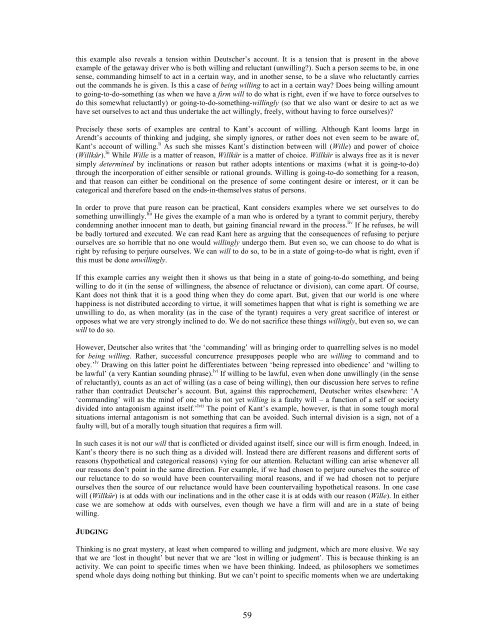
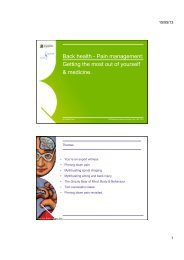
![Recycling [ PDF, 62KB ] - University of Queensland](https://img.yumpu.com/51805185/1/184x260/recycling-pdf-62kb-university-of-queensland.jpg?quality=85)
